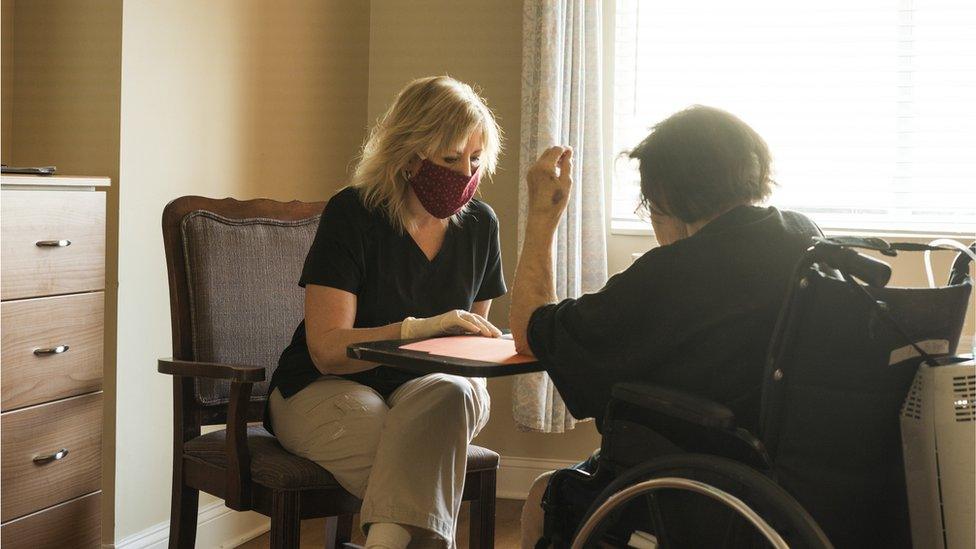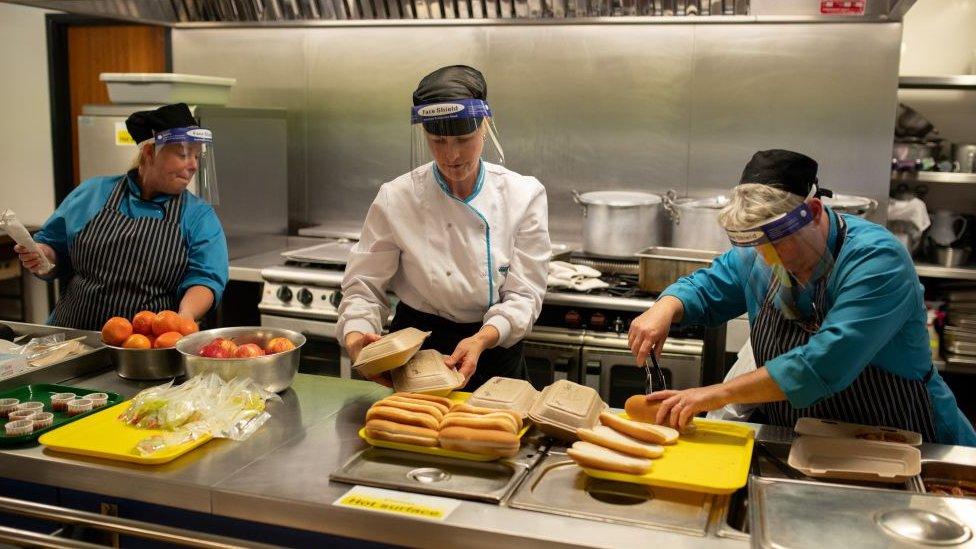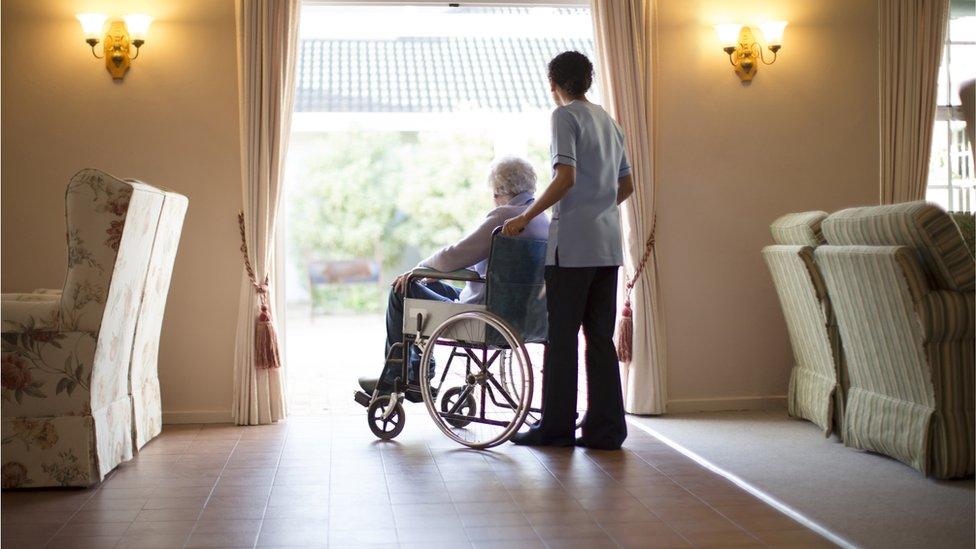Living wage for care workers in Welsh government's plans
- Published

The Welsh government is pledging the "real living wage" for social care staff
A living wage for care staff and jobs and training for young people are among the Welsh government's plans for the next five years.
First Minister Mark Drakeford has set out his government's plans for the term, following his Senedd election success.
It includes building 20,000 new low-carbon "social homes" for rent, and more 20mph zones in residential areas.
But opposition parties criticised the lack of detail in the document.
The Welsh Conservatives said it was alarming that the 17-page programme for government, external was the "sum total" of Labour's plan. Plaid Cymru said it lacked targets.
Meanwhile Mark Drakeford has refused to say whether he would raise income tax, reiterating there is no plan to do so while the economy is recovering.
Welsh ministers said they would put climate change at the "heart of everything the Welsh government does".
Mr Drakeford's programme incorporates pledges made by the Welsh Labour leader at the recent Welsh election.
He was returned to power in May after his party won 30 Senedd seats - one short of a majority, meaning he will need some opposition help to pass budgets and laws.
The first minister said: "We will build a fairer, greener and stronger Wales in which everyone plays a part - we don't want anyone to be left behind or held back."

The Welsh government is pledging action on single-use plastics
Speaking to BBC Wales the first minister said the 20,000 homes would be built to the "highest" environmental standards and provided through housing associations and councils.
"They will be homes that produce more energy than they consume," he said.
The plans include giving everyone under the age of 25 the offer of work, education, training or self-employment, and a new law on air pollution, called a Clean Air Act.
Ministers pledged to extend the entitlement to free school meals "as far as resources allow" - Welsh Labour has come under pressure from within its own ranks to expand the scheme.
Meanwhile the document says the 20mph limit would become the default speed limit in residential areas.
The programme - made up of a series of short bullet point policy plans - does not say when the ideas will be implemented within the next term, which ends at the 2026 Senedd election.
However Mr Drakeford told PA news agency that he hoped social care changes would come in in the "first half" of this Senedd's five-year term.

The Welsh government said it would extend free school meals as far as resources allowed
Income tax
The document says the the Welsh government will "not take more in Welsh rates of income tax from Welsh families for at least as long as the economic impact of coronavirus lasts".
In the Welsh Parliament on Tuesday Conservative Senedd leader Andrew RT Davies asked Mr Drakeford if he wants to raise taxes during some point in the Senedd term.
"Well the member will have to wait to see," Mr Drakeford said. "It will depend on the circumstances."
"What lies beyond the recovery can only sensibly be decided in the circumstances that we will face, when we get there."
The Welsh government programme said it would "seek to reform council tax", and change the way council elections work to reduce the "democratic deficit".
Under the plans mental health would be prioritised for investment, and more single-use plastics would be banned - although plans were previously announced to do this last year.
England has already banned the use of single-use plastic straws, cotton buds and stirrers - Wales has consulted on doing the same, with the original plans going further.
The document did not put a figure on extra cash for mental health services, although Mr Drakeford said there would be "millions more".
He said a scheme where child and adolescent mental health services go into schools would be rolled out in every council area.
Other pledges include:
Creating 125,000 "all-age" apprenticeships
A new medical school in north Wales
New laws to modernise the taxi and private vehicle sector
Supporting 80 re-use and repair hubs in town centres
Create a national forest stretching from north to south Wales
Establish a "peace academy" - a community of researchers to shape international strategies - in Wales
There had been calls for a pay rise for social care workers in the wake of the Covid pandemic - at the May Senedd election Labour pledged to pay the "real living wage" to social care workers.
The real living wage is higher than the national living wage, and is pegged to the cost of living. It is currently set at £9.50 outside London.
Ministers also plan an independent commission to consider Wales' constitutional future, with the Welsh government seeking control over further powers including policing.

Mark Drakeford's plan was criticised for lacking detail
'Absent on targets'
Welsh Conservative Senedd leader Andrew RT Davies said people and businesses would be "alarmed and concerned that this 17-page document is the sum total of Labour's plan to get Wales on the road to recovery after the pandemic".
"We desperately need this Welsh government to succeed if we are to recover from the most difficult year our country has experienced, but unfortunately this programme - combined with Labour's poor track record over the past 22 years - does not inspire confidence."
Plaid Cymru deputy leader Rhun ap Iorwerth said there was "nothing transformational or ambitious about Labour's program for government".
"There's no economic strategy to support and help small and medium Welsh businesses grow or any detail on how they will deliver high-skilled, well-paid jobs in all parts of Wales.
"There's nothing here that comes close to tackling child poverty - nor any concrete commitment to extending free school meals. And there's nothing here that addresses the ever-growing housing crisis that is pricing young people out of their communities.
"This program, thin in detail and absent of targets, almost certainly does not provide the new start that Wales so desperately needs and is not the plan needed to take Wales forward to recovery and beyond."
The Welsh government will likely need at least one vote from non-Labour MSs to change laws and pass budgets.
Mr Drakeford said the election result was an "invitation to opposition parties to work with us on those aspects of our programme where they themselves have an interest".
"The programme is there for others to work with us on it," he said.


Wales is embarking on its sixth successive period of Labour-led government since devolution started.
The last two began in circumstances Welsh Labour would not have chosen. In 2011 it was austerity. In 2016 it was Brexit.
But the backdrop this time is more daunting.
Opponents say the Welsh government's plans lack the ambition to meet the challenge of the pandemic and its legacy.
But, as in those previous terms in office, Labour's lack of an outright majority means it will need talk to other parties to get the job done.
- Published17 March 2021
